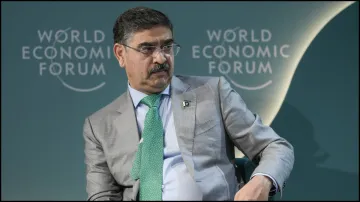Pakistan's retaliatory 'precision military strikes' kill three women, four children in Iran
Islamabad said it undertook a series of highly coordinated and specifically targeted precision military strikes against "Pakistan-origin terrorists" in Iran as part of 'Operation Marg Bar Sarmachar'. However, the people killed were not Iranian citizens, according to officials and media.

Pakistan attacks Iran: At least seven people, including three women and four children, have been killed in Pakistan's retaliatory attacks on Iran's Sistan and Baluchistan province, said the province's deputy governor Alireza Marhamati on state TV, in the latest escalation of violence that has dramatically soared relations between the two countries. Marhamati said the people killed in Pakistan's attack were not Iranian citizens, CNN reported.
Iranian state media reported explosions around Saravan and an investigation has been launched by security officials. “At 4:30 a.m. explosions were heard in a border village, several missiles were fired at the village,” Marhamati said. The attacks come in retaliation to Iran's missile and drone strikes in Balochistan on Tuesday targeting the Sunni militant group Jaish al-Adl.
Iranian state television, quoting an anonymous official after the strike, said Tehran strongly condemned the attack and “demanded an immediate explanation” from Pakistan. Confirming Thursday's strikes, Pakistan's Ministry of Foreign Affairs said it undertook "a series of highly coordinated and specifically targeted precision military strikes" against "Pakistan-origin terrorists" in Iran's Sistan-o-Baluchistan as part of 'Operation Marg Bar Sarmachar'.
Baloch militant group threatens retaliation
"A number of terrorists were killed during the Intelligence-based operation — codenamed 'Marg Bar Sarmachar'. Over the last several years, in our engagements with Iran, Pakistan has consistently shared its serious concerns about the safe havens and sanctuaries enjoyed by Pakistani-origin terrorists calling themselves *Sarmachars* on the ungoverned spaces inside Iran. Pakistan also shared multiple dossiers with concrete evidence of the presence and activities of these terrorists," read an official statement.
Pakistan further claimed the action was taken in light of credible intelligence of impending large-scale terrorist activities by the "Sarmachars" and asserted that the country will continue to take all necessary steps to preserve the safety and security of its people.
"Iran is a brotherly country and the people of Pakistan have great respect and attention for the Iranian people. We have always emphasised dialogue and cooperation in confronting common challenges including the menace of terrorism and will continue to endeavour to find joint solutions," the Foreign Ministry further said.
Meanwhile, the Baloch Liberation Army, a separatist group, said in a statement the strikes targeted and killed its people. "Pakistan will have to pay a price for it. Now the Baloch Liberation Army will not remain silent. We will avenge it and we announce war on the state of Pakistan," said the group.
Pakistan expels Iranian envoy, Tehran admits attacks
Strongly condemning Iran's Tuesday attack on Balochistan that killed two children, Pakistan warned that the incident could have "serious consequences" and was "completely unacceptable", expelling the Iranian ambassador and recalling its envoy from Tehran.
The foreign ministry called Tehran's action an "unprovoked and blatant" breach of Pakistan's sovereignty. "This illegal act is completely unacceptable and has no justification whatsoever. Pakistan reserves the right to respond to this illegal act," it said. Notably, Pakistan's Foreign Minister Jalil Abbas Jilani told his Iranian counterpart that the unprecedented attack by Iran on Tuesday seriously damaged the ties between the two nations.
The development came after Iran admitted to carrying out the airstrike in Pakistan and affirmed that they only targeted terrorists and not Pakistan civilians. While speaking at the World Economic Forum's annual meeting in Davos, Iran's Foreign Minister Hossein Amirabdollahiansaid he had spoken to his Pakistani counterpart and "assured him that we do respect the sovereignty and territorial integrity of Pakistan and Iraq."
The exchange comes amid Israel’s war on Hamas in the Gaza Strip raising tensions across the wider Middle East. Iran launched similar attacks on a Kurdish semi-autonomous region in Iraq as well as on the bases of Islamic State in Syria. Iraq has recalled its ambassador from Iran for consultations.
Why did Iran attack Pakistan?
According to al-Arabiya News, the militant group was formed in 2012 and is designated as a “terrorist” organization by Tehran. It has a history of launching multiple attacks on Iranian security forces over the years. According to Iranian media, a police station in Sistan-Baluchistan was attacked wherein at least 11 policemen were killed. Later, the group claimed responsibility for the attack.
Iran and Pakistan share a 900-kilometer (560-mile), largely lawless border in which smugglers and militants freely pass between the two nations. The route is also key to global opium shipments coming out of Afghanistan. For both countries, the cross-border attacks renew questions about the preparedness of their own militaries, particularly their radar and air defense systems.
Jaish al-Adl, or Army of Justice, is a separatist militant group that operates on both sides of the border and has previously claimed responsibility for attacks against Iranian targets. Its stated goal is the independence of Iran’s Sistan and Baluchistan province, which neighbours Pakistan.
ALSO READ | India's first response over Iran's airstrikes in Pakistan: 'We understand actions taken in self-defence'